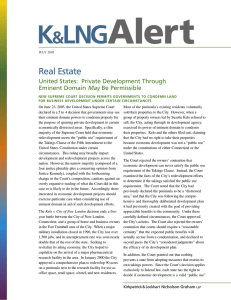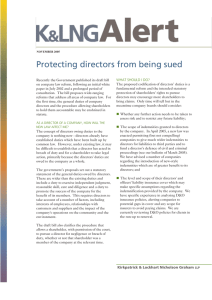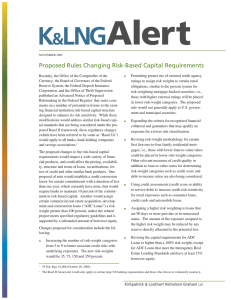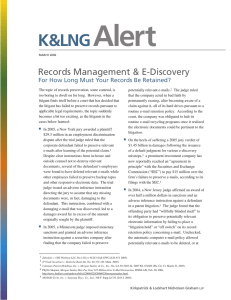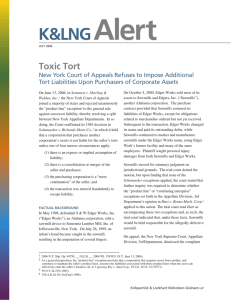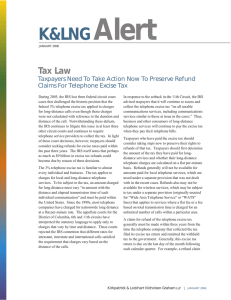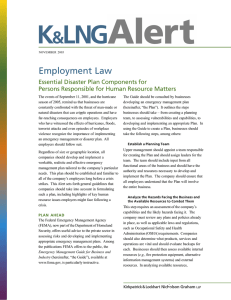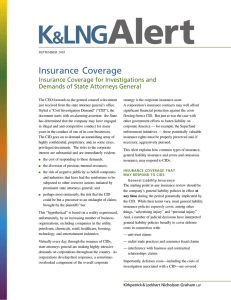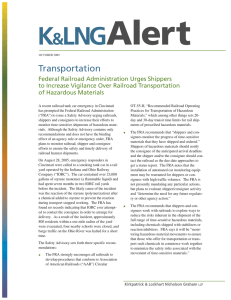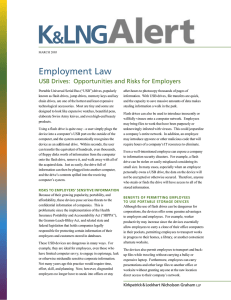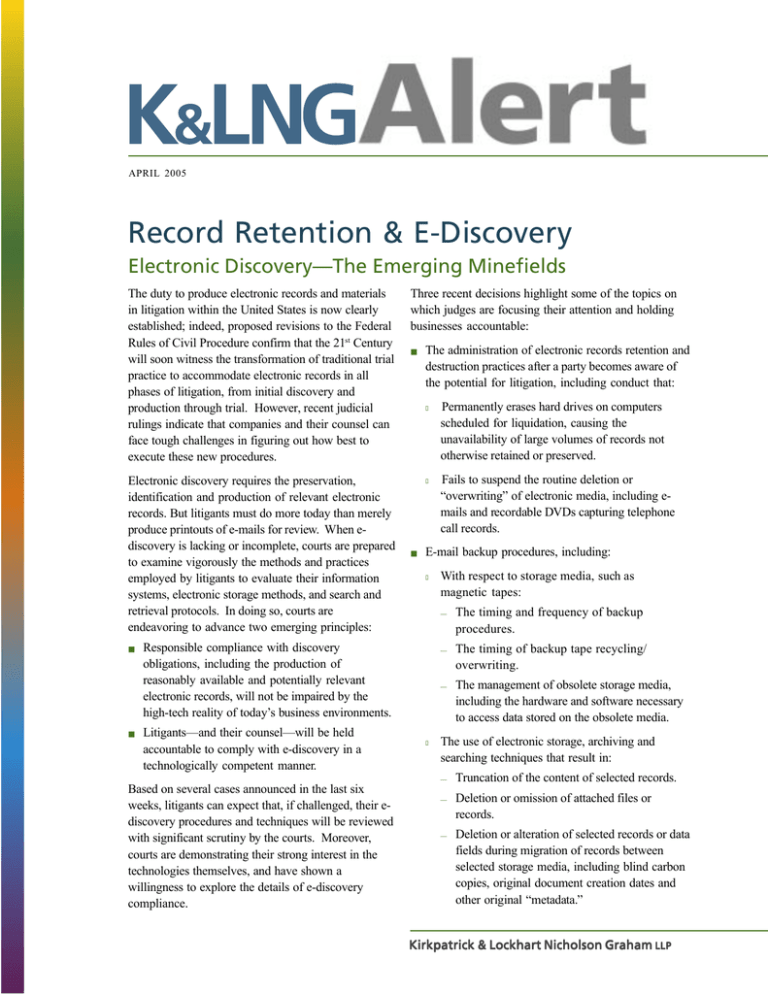
APRIL 2005
Record Retention & E-Discovery
Electronic Discovery—The Emerging Minefields
The duty to produce electronic records and materials
in litigation within the United States is now clearly
established; indeed, proposed revisions to the Federal
Rules of Civil Procedure confirm that the 21st Century
will soon witness the transformation of traditional trial
practice to accommodate electronic records in all
phases of litigation, from initial discovery and
production through trial. However, recent judicial
rulings indicate that companies and their counsel can
face tough challenges in figuring out how best to
execute these new procedures.
Three recent decisions highlight some of the topics on
which judges are focusing their attention and holding
businesses accountable:
Electronic discovery requires the preservation,
identification and production of relevant electronic
records. But litigants must do more today than merely
produce printouts of e-mails for review. When ediscovery is lacking or incomplete, courts are prepared
to examine vigorously the methods and practices
employed by litigants to evaluate their information
systems, electronic storage methods, and search and
retrieval protocols. In doing so, courts are
endeavoring to advance two emerging principles:
Fails to suspend the routine deletion or
“overwriting” of electronic media, including emails and recordable DVDs capturing telephone
call records.
■
■
Responsible compliance with discovery
obligations, including the production of
reasonably available and potentially relevant
electronic records, will not be impaired by the
high-tech reality of today’s business environments.
Litigants—and their counsel—will be held
accountable to comply with e-discovery in a
technologically competent manner.
■
The administration of electronic records retention and
destruction practices after a party becomes aware of
the potential for litigation, including conduct that:
Permanently erases hard drives on computers
scheduled for liquidation, causing the
unavailability of large volumes of records not
otherwise retained or preserved.
■
E-mail backup procedures, including:
With respect to storage media, such as
magnetic tapes:
—
—
—
The timing of backup tape recycling/
overwriting.
The management of obsolete storage media,
including the hardware and software necessary
to access data stored on the obsolete media.
The use of electronic storage, archiving and
searching techniques that result in:
—
Based on several cases announced in the last six
weeks, litigants can expect that, if challenged, their ediscovery procedures and techniques will be reviewed
with significant scrutiny by the courts. Moreover,
courts are demonstrating their strong interest in the
technologies themselves, and have shown a
willingness to explore the details of e-discovery
compliance.
The timing and frequency of backup
procedures.
—
—
Truncation of the content of selected records.
Deletion or omission of attached files or
records.
Deletion or alteration of selected records or data
fields during migration of records between
selected storage media, including blind carbon
copies, original document creation dates and
other original “metadata.”
Kirkpatrick & Lockhart Nicholson Graham LLP
■
■
The failure to suspend ongoing deletion schedules,
resulting in the routine destruction of e-mail
records that may be directly relevant to the subject
matter of litigation.
the jury returned a verdict for $29.3 million—
including $20.2 million in punitive damages—
based on e-mails produced and not produced.
■
Effectively granting a default judgment against
one defendant—the jury will be read large portions
of the complaint and other allegations prepared by
plaintiff and will be instructed that the facts read to
it are deemed established for all purposes and that
the jury may consider the allegations as facts in
determining, for the purpose of punitive damages,
whether defendant sought to conceal misconduct.
■
The revocation, shortly before the start of trial, of
the pro hac vice admission of lead trial counsel,
thus excluding the attorney from further
proceedings in the case.
Techniques employed to search electronic records
to identify potentially relevant materials,
including:
Accounting for the physical location (and
probable content) of all historic records.
Properly structuring search scripts and
protocols, including the avoidance of script
errors that:
—
—
—
—
■
Fail to locate records that included
responsive attachments.
Prevent the effective search of e-mail records
created and maintained by different software
programs.
Employ “hyper case sensitive” searching
methods, resulting in an under-inclusive
search pattern.
Omit electronic mail records addressed to
“group” names or addresses.
Delivery of accurate information about electronic
records and discovery compliance, including:
The cases from which the preceding lessons have been
extracted confirm the complexity and importance of
planning, preparing and conducting well-designed
and effective procedures to preserve, locate, search
and make available electronic records in pending civil
litigation. While all of the cases potentially involve
further appeals, there is little question of a trend that
will challenge companies and their counsel
significantly in the months and years ahead. The
cases referred to in this client alert are:
Information retained within a company’s
internal electronic document management
system.
■
Zubulake v. UBS Warburg LLC (02 Civ. 1243
SAS), U.S. District Court for the Southern District
of New York (April 6, 2005)
Verification of the discovery procedures
employed, and the results of those procedures.
■
Coleman (Parent) Holdings, Inc. v. Morgan Stanley
& Co., Inc. (Case No. 03-5045 AI), 15th Judicial
Circuit, Palm Beach Co., Florida (March 23, 2005)
■
E*Trade Securities LLC v. Deutsche Bank AG
(Civil No. 02-3711 RHK/AJB), U.S. District Court
for the District of Minnesota (Feb. 17, 2005)
Confirmation or testing of cost and time
estimates for performing discovery procedures
involving electronic records.
THE CONSEQUENCES
Facing serious problems with respect to some or all of
these issues, some courts have aggressively exercised
their authority to impose sanctions. Some of these
sanctions have been harsh:
■
Jury instructions that permit juries to make
“adverse inferences” that the discovery misconduct
was likely to be concealing records unfavorable to
the party’s case. In one wrongful termination case,
2 APRIL 2005
Bruce H. Nielson
bnielson@klng.com
202.778.9256
Jeffrey B. Ritter
jritter@klng.com
202.778.9396
KIRKPATRICK & LOCKHART NICHOLSON GRAHAM LLP
FOR MORE INFORMATION, please contact one of the following K&LNG lawyers:
Boston
Mark E. Haddad
Thomas Holt
617.261.3116
617.261.3165
Dallas
Michael D. Napoli 214.939.4927
Jaime Ramon
214.939.4902
mhaddad@klng.com
tholt@klng.com
mnapoli@klng.com
jramon@klng.com
Harrisburg
Carleton O. Strouss 717.231.45003 cstrouss@klng.com
212.536.3905 eciko@klng.com
212.536.3916 elicker@klng.com
Pittsburgh
David R. Cohen
Robert L. Byer
Richard Paciaroni
Lucas G. Paglia
412.355.8682
412.355.6200
412.355.6767
412.355.6246
dcohen@klng.com
rbyer@klng.com
rpaciaroni@klng.com
lpaglia@klng.com
San Francisco
Jonathan D. Jaffe
415.249.1023 jjaffe@klng.com
Edward P. Sangster
415.249.1028 esangster@klng.com
Deborah Bailey-Wells 415.249.1065 dbaileywells@klng.com
Los Angeles
Michael L. Mallow 310.552.5038 mmallow@klng.com
Ronald W. Stevens 310.552.5521 rstevens@klng.com
Miami
Marc H. Auerbach 305.539.3340 mauerbach@klng.com
Newark
Donald W. Kiel
New York
Eva M. Ciko
Eugene R. Licker
Washington
Bruce H. Nielson
Jeffrey B. Ritter
202.778.9256 bnielson@klng.com
202.778.9396 jritter@klng.com
973.848.4064 dkiel@klng.com
www
w.. k l n g . c o m
BOSTON
■
DALLAS
■
HARRISBURG
■
LONDON
■
LOS ANGELES
■
MIAMI NEWARK
■
■
NEW YORK
■
PITTSBURGH
■
SAN FRANCISCO
■
WASHINGTON
Kirkpatrick & Lockhart Nicholson Graham LLP (K&LNG) has approximately 950 lawyers and represents entrepreneurs, growth and middle market
companies and leading FORTUNE 100 and FTSE 100 global corporations nationally and internationally.
K&LNG is a combination of two limited liability partnerships, each named Kirkpatrick & Lockhart Nicholson Graham LLP, one qualified in Delaware, U.S.A.
and practicing from offices in Boston, Dallas, Harrisburg, Los Angeles, Miami, Newark, New York, Pittsburgh, San Francisco and Washington and one
incorporated in England practicing from the London office.
This publication/newsletter is for informational purposes and does not contain or convey legal advice. The information herein should not be used or relied
upon in regard to any particular facts or circumstances without first consulting a lawyer.
Unless otherwise indicated, the lawyers are not certified by the Texas Board of Legal Specialization.
Data Protection Act 1988 - We may contact you from time to time with information on Kirkpatrick & Lockhart Nicholson Graham LLP seminars and with our
regular newsletters, which may be of interest to you. We will not provide your details to any third parties. Please e-mail cgregory@klng.com if you would
prefer not to receive this information.
© 2005 KIRKPATRICK & LOCKHART NICHOLSON GRAHAM LLP. ALL RIGHTS RESERVED.



